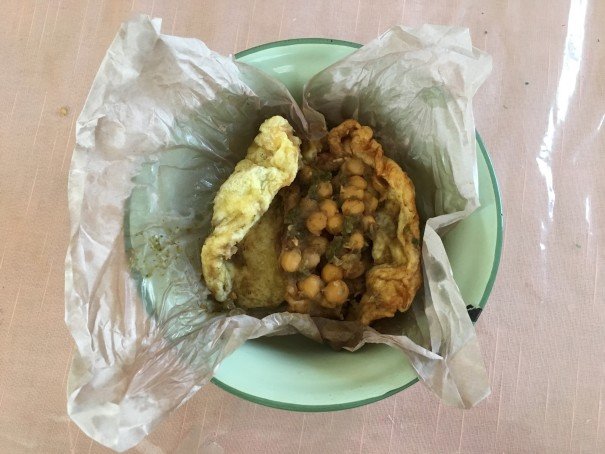
The Gloriously Unhealthy Ultimate Breakfast Sandwich

The Gloriously Unhealthy Ultimate Breakfast Sandwich
Doubles in Trinidad and Tobago
My grandfather’s surname is horribly misspelled on his tombstone – “Law Yeow” as opposed to the “Law Yue” it was meant to be, even further from the “Lawyue” it is today. But this is the least of our worries. Everything else is a mess, too.
Carved in the 1950s, the slab of pearl-white granite has aged horribly, with nearly half the monument turned ash black. The plot is uneven, weeds have commandeered most of the trim shrubbery, and the morning heat is suffocating. It can’t be helped, I suppose. Nearly 60 years of outdoor wear and tear in the Caribbean has rendered this tombstone almost unrecognizable, to the point that we nearly pass it among the rows of people who are buried here in Paradise Cemetery.
It’s November 1st, All Saint’s Day, and my Dad and I have returned to Trinidad and Tobago to pay our respects to my grandfather. We arrive at the cemetery at 8 am, clear the surrounding weeds with a machete, give the tomb a new coat of white paint, light the candles, and say a few silent words. By 9 am we’re done, and my uncle is weaving through one-way streets in the hilly valley of San Fernando towards our next destination, breakfast.
Most of the great cuisine in the world is served curb-side by a beleaguered person with calloused hands from a broken down cart that uses a cement brick to substitute for a missing wheel. Aesthetics are entirely negligible to the line of locals waiting patiently in the sizzling heat, hoping to get their serving before it empties. The same applies in Trinidad, where the line of locals has curved into the street, causing the already gridlocked mania further grievance.
Everyone is waiting for Doubles, the ultimate breakfast sandwich – two pieces of bara, fried bread, with a healthy spoonful of curried chana: chickpeas spiced with cumin, curry powder, onion, and garlic. Topped with kuchela, a sour mango chutney, and a touch of blazing pepper sauce, it’s wrapped in wax paper and placed in brown paper bags. Much like the vendor’s cart and my grandfather’s tombstone, Doubles are entirely lacking in visual excitement. By the time we get home, the grease has seeped through all the containers and the Doubles look like microwaved bread with a filling of boiled mush.
But don’t be fooled. Doubles are gloriously unhealthy and delectably messy. This sandwich, like the rest of the cuisine in Trinidad, is emblematic of the island’s wayward history. Western world powers controlled the twin islands for much of the 18th and 20th centuries, importing slaves of Indian, African, and Chinese descent to work the plantations. Post-emancipation and post-independence, centuries of inter-racial development has produced one of the most ethnically-diverse populations in the world, with a cuisine to match. Doubles, for all intents and purposes, are uniquely Trini.
I’m unsure if my grandfather ate Doubles for breakfast when he arrived in Trinidad. We don’t know much about the man. But we pay our respects because, like Doubles, it represents our lineage: a past that has stood the test of time, weathering changing surnames, new immigrant populations, and that blasted Caribbean sun.